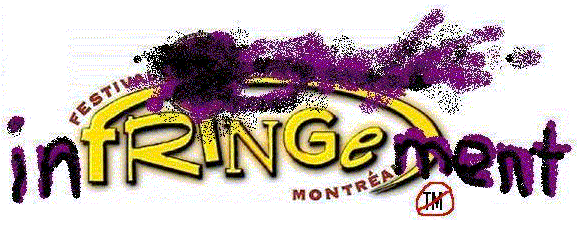infringement History

HISTORY
***
(514) 273-6929
(514) 842-1467
infringement@travestytheatre.com
***
JOIN THE INFRINGEMENT AND RECLAIM
YOUR CULTURE!!!
EYE Weekly, Toronto
[Former] Fringe producer Nancy
Webster… was instrumental in the formation and direction of the Canadian
Association of Fringe Festivals (CAFF), which has registered the Fringe
trademark…the corporate approach has…raised some eyebrows.
"The Edinburgh producer was here a
few years back to do a little session about how she does the Edinburgh
Fringe," Webster recalls. "She thought the idea of a Fringe trademark was
appalling -- so against what the Fringe was all about."
Webster says she could relate on a
purely emotional level to the woman's reaction, but insists that the move
to a formal trademark was made solely to protect the artists and the
integrity of the festivals. (ed: ??!!!)
Webster's background in corporate
fundraising also made it easier for her to pursue corporate connections.
"I guess I'm a little more comfortable with the people artists normally
refer to as 'suits' than some of the other Fringe
producers."
Source: Connolly, Kevin, "State of
the art: Tenth annual Fringe theatre festival is not just a showcase, but
a creative breeding ground ", EYE Weekly, Toronto: 07.02.98.
The "Fringe"
The term "Fringe" theatre originated
in Edinburgh, Scotland in 1947. The Fringe Festival was born when local
artists and activists protested the strict entry criteria into the
Edinburgh International Festival, a corporate theatre showcase. Boasting
the best in experimental and Do-It-Yourself theatre, it was open to anyone
who wanted to participate, and was the beginning of one of the world's
most interesting theatre festivals. Indeed, a whole new style and approach
to the craft was developed: risky, experimental, low budget, and wacky;
often employing unique venues. The fringe phenomenon spread virally, not
only outgrowing the original festival, but multiplying across the globe.
There are currently over 30 of them.
Unfortunately, this international
festival of anything-goes DIY theatre has recently come under threat from
corporate interests: the Canadian Association of Fringe Festivals (CAFF)
has trademarked the word "Fringe" and begun restricting its use for
artists. It is now common to see the festivals being sponsored and
endorsed by corporate media, cosmetics companies, beer conglomerates, etc.
Once a popular people's festival of creative resistance and expression, it
is now a co-opted commodity with a corporate agenda. A Fringe™.
In Montreal, summer of 2001, the
first show ever in the history of the fringe was kicked out. The Gazette,
a Can-WEST Global publication (and corporate sponsor of the Fringe™),
literally kicked anti-authoritarian show Car Stories out of the festival.
A playful attempt to charge the theatre critic, followed by a satirical
critique when she refused to pay, sparked off a chain of disturbing
reactions. Not only did The Gazette threaten to withdraw $15,000 in
sponsorship, but also halted all fringe reviews. Car Stories was asked to
vacate the premises by the end of the day. The Montreal Fringe Festival™
predictably sided with the corporate sponsors. The CAFF™, disregarding its
own mandate, sided with the Montreal Fringe Festival™.
So, what does one do when the
corporate mentality shuts down the real fringe and co-opts its image? We
demand the following:
· The word "Fringe" must be
un-trademarked or placed in a public trust.
· An accountability mechanism must be
created to uphold the mandate.
· There must be Fiscal transparency.
· Conflict-of-interest sponsorships
must stop.
· Democratic principles in organizing
the festivals must be implemented.
· Artists who were defrauded by
Fringe Festivals™ must be reimbursed.
RECLAIM THE FRINGE !!!